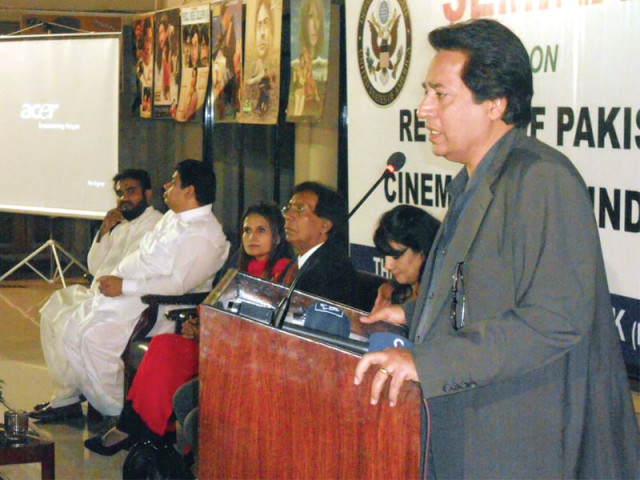Revisiting the death and rebirth of Pakistani cinema
Leading names in film talk about political shackles and the film industry.

Syed Noor discusses the trajectory of Pakistani film industry and aspires to see a more positive role of the government in its revival. PHOTO: PUBLICITY
On the heels of the success of two local new-age cinema projects, interest in Pakistani films has considerably increased. Upholding the rising fervour surrounding the revival of cinema in the country, the Pak-US Alumni Network (Lahore Chapter) organised a seminar on October 26 in the cultural capital. The event, which took place at the Pakistan College of Law, was graced with the presence of leading names in cinema — Syed Noor, Shehzad Rafique and Chaudhry Kamran.
The discussion, titled Seminar on Revival of Pakistani Cinema and Film Industry, shed light on the general perception of cinema in the Pakistani society and the political restraints that it has had to bear in the country. “The decline [of cinema] was constant because in our society, getting involved in films was discouraged,” said Syed Noor. For instance, actor Shah Zaman Khan (Sudhir), known as the first action hero of Pakistani cinema, had to initially hide his profession from his conservative Pathan family, out of the fear that his parents would hurt or disown him. “I always say that you will never see a father encourage his child to join the film industry. This is the standard mindset,” he added.
Noor feels that the stigma attached to the film industry in Pakistan has been aggravated by policies that have dominated the state. The political regimes of the country, he believes, have been an obstacle in the way of the success of Pakistani cinema. He is skeptical of General Ziaul Haq’s term; although Punjabi cinema emerged to the forefront during his time, cinema on the whole underwent a structural demise.
Concurring with Noor, Wajiha Raza Rizvi, the director of the Film Museum Society, traced the decline of cinema back to Zia’s era, during which the industry saw a 50% drop in its releases. In constrast, General Yahya Khan’s tenure witnessed the highest box office collections, with nearly 114 films made in a year.
Producer-director Shehzad Rafique, who considers himself a student of Noor, believes that both democratic and martial law regimes have failed to improve the environment for film-making. “What we really need is a people-friendly government. The dictatorial governments were only concerned with their own agendas; Zia marketed his rule under the banner of Islam, which had a huge social impact on how film was perceived,” he stated.
Adding to the discussion on the demise of the industry, Noor asserted that the absence of financiers resulted in film-makers turning to illegal activities and earning black money. The lack of funds, coupled with dependence on black money, furthered cinema’s deterioration. Noor aspires to see the state employ a more positive role, similar to the one of Iranian government, which founded the Farabi Cinema Foundation. “We could do something like Iran, which has had to face similar issues as far as its film industry is concerned. The Iranian government offered to provide incentives and infrastructure to their film-makers to make good films. And their efforts bore results in the form of their first Oscar win in 2011,” he suggested.
Noor holds that if one is to look at the trajectory of Pakistani cinema, it has definitely come a long way. Earlier, there were no academies, worshops and other learning avenues for film. Today, what can be considered a favourable turn, institutes such as National College of Arts, Beaconhouse National University and now, the Forman Christian College in Lahore, have introduced film departments. In fact, Noor himself runs a film academy.
Commending Noor for his resilience and indomitable will, Rafique said, “I remember when I graduated from university, it was a huge gamble to pursue film-making as a full-time profession. But during that time, I remember that Noor sahab was one person who had enough focus and vision to survive. He has laid the foundation of the work that is being done today.” With recent box office successes such as Waar, things have changed. According to Rafique, it’s no longer about surviving as a film-maker in the industry — it’s about maintaining focus and a concrete vision.
Published in The Express Tribune, October 29th, 2013.
Like Life & Style on Facebook, follow @ETLifeandStyle on Twitter for the latest in fashion, gossip and entertainment.



















COMMENTS
Comments are moderated and generally will be posted if they are on-topic and not abusive.
For more information, please see our Comments FAQ